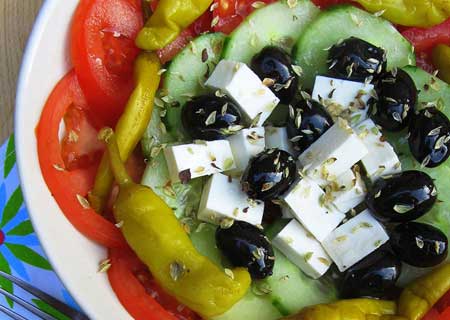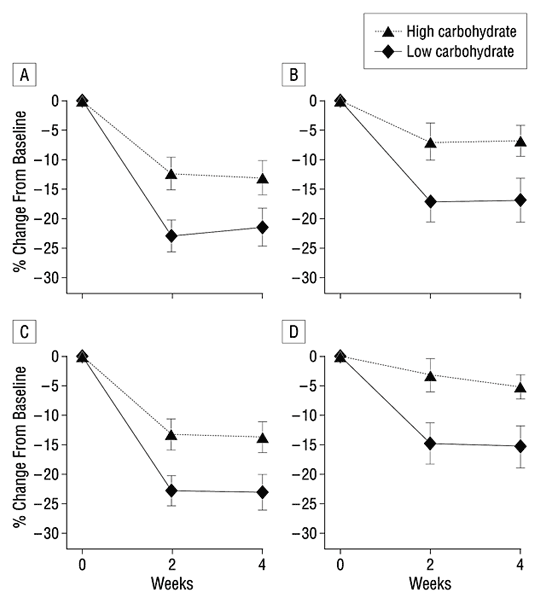Questioning Beliefs
September 9, 2010 Written by JP [Font too small?]Medical news is often classified into three categories. The most common and under-appreciated variety provides corroborative data on already established principles. Example: Exercise does your body and mind good. The second category adds a new twist to pre-existing information. Example: Eating plenty of vegetables reduces the risk of cardiovascular disease and all-cause mortality – especially in the context of a lower carbohydrate diet. The final category turns old concepts upside down. Example: Students have different and distinct learning styles which need to be catered to in order for them to thrive academically. Not necessarily. The details of these news items and more come courtesy of various contributors on Twitter.

The LATimeshealth Twitter account recently drew my attention to a study that appears in the latest edition of the Annals of Internal Medicine. In it, researchers from the Harvard School of Public Health examined a proposed link between low carbohydrate diets and mortality rates. The population pool involved approximately 130,000 men and women following carbohydrate restricted diets over a 20 + year follow up period. The results indicate that “a higher vegetable low-carbohydrate score was associated with lower all-cause mortality (-20%) and cardiovascular mortality (-23%)”. (1,2)
Based on the previously reported information, some may conclude that a vegetarian form of low carb dieting would be ideal. However, this doesn’t appear to be a necessity. A few recent studies have examined the effects of two different vegetable-rich, carbohydrate restricted diets. One was based on a “paleolithic, hunter-gatherer” model and the other was a vegetarian eating plan.
The paleolithic diet included eggs, fish, meat and poultry. It resulted in a 22% decline in LDL (“bad”) cholesterol, a 35% reduction in triglycerides and a 72% drop re: insulin resistance.The vegetarian (“Eco-Atkins”) diet reduced LDL (“bad”) cholesterol by 21%, triglycerides by 40% and insulin resistance by 33%. However, unlike the paleolithic diet, the vegetarian diet did not raise HDL (“good”) cholesterol levels. (3,4)
A recent tweet by WomensHealthMag encourages its readers to take up running. The claim is that this form of vigorous exercise can protect against arthritis and heart disease, improve mental health and ultimately promotes longevity. The medical literature tends to support these claims. But the benefits aren’t afforded exclusively to runners. Instead of focusing on a specific type of exercise, consider the following data as an incentive to engage in whatever form of physical activity you prefer. (5,6)
- Osteoarthritis affects an estimated 27 million seniors in the US alone. A recent review in the Journal of Gerontological Nursing emphasizes that exercise can “delay the onset of physical limitation” and support “normal joint health for older adults”. (7)
- A current study that examined over 2,600 sixth-grade females discovered that those who were most fit had healthier levels of various cardiometabolic risk factors. This reinforces the need to promote physical fitness at an early age. (8)
- Data collected from the Women’s Health Study reveals that those with the highest levels of “leisure-time” physical activity were a lower risk of stroke. The authors of the summary single out “regular, brisk walking” as a superior form of exercise. (9)
- An evaluation of 3,645 women in “disadvantaged neighborhoods” found that those who were the most active were also the least likely to struggle with depression. On the other hand, women who spent more time in front of the computer or watching TV were at an increased risk for depression. The conclusion of the paper states that, “Reducing time spent in sedentary behaviors may be a key strategy in the promotion of better mental health”. (10)

Tara Parker-Pope recently posted a link on her nytimeswell Twitter account that questions many of the commonly accepted beliefs about learning. What do you think science tells us about the ideal learning environment? Many would say that an optimal work space should be quiet and that you ought to stick to a regular schedule, setting boundaries and goals to enhance your performance. And of course, dogged, single-minded dedication to a particular task is also paramount to academic success. But you may be surprised to find out that behavioral scientists aren’t always in agreement with these commonsense guidelines.
Over the past few decades, new evidence-based theories have emerged about how students of all ages can learn best. Some of the key findings include: a) alternating study locations to improve retention; b) varying the type of material you study (ex: grammar, reading, vocabulary) can “leave a deeper impression on the brain” and improve test performance; c) spacing out study sessions is more effective in promoting long term learning than fewer, more intense, study periods. What’s interesting is that this new school of thought appears to benefit the learning process of both younger and older individuals. (11,12,13,14,15)
In an odd way, researching medicine is similar to being a filmgoer. Every once in awhile I’ll find a study that is absolutely innovative. But most of the time I pour through research that treads over familiar territory. That doesn’t mean that it’s not valuable. It’s just not groundbreaking. Thankfully, if I look very carefully, I’ll frequently find some intriguing details in almost every scientific paper I evaluate. Likewise, most films contain elements that we’ve all seen before – a death-defying car chase, comedic banter between two rivals, special effects that transport us to a different world, etc. However, we can still enjoy the show because of the small details that differ from film to film. The same is true of medical data. It reminds you of what’s important to know and sometimes offers novel clues about what’s new and what’s to come.
Be well!
JP
Tags: Low Carb, Stroke, Vegetarian
Posted in Exercise, Heart Health, Nutrition

September 9th, 2010 at 2:04 pm
Great post.
In my opinion, when I read the latest research and studies regarding health, nutrition, and activity, I like to start by envisioning how it fits within the framework of how humans have evolved. I find that many robust, peer-replicated, evidence-based studies along these lines seem to correlate towards those of our ancestors’ lifestyles.
Sedentary lifestyle not optimal? Sure. Our physiology was selected against millions of years nomadic hunting/gathering to which we we’ve only abandoned for the last 10,000 or so. It’s probably why I fantasize about stepping away from my desk and putting a spear through an annoying co-worker that I pretend to be an ancient ungulate – lol!
Carb-rich diet not optimal? Same thing. Humans have only relied on agriculture for a fraction of our evolutionary ancestry. It’s not surprising that the best diets proven to be the healthiest and best for us tend to be one that mirrors that of our ancient ancestors. Minimal carbs, minimal protein, lots of greens, fruit instead of candy.
JP, do you feel that understanding our evolutionary past is important to understanding good health behaviors?
September 9th, 2010 at 2:28 pm
Chris,
Yes. I wholeheartedly agree with that idea. That’s part of the reason why I’m not a big fan of grain-rich diets and I prefer grass-fed meat over the conventionally raised variety.
As we speak, I’m writing a column about my current “alternate day fasting” experiment. This is yet another way that I’m trying to mimic the lifestyle of our distant ancestors.
re: modern day nutrition
I believe one of man’s greatest follies is the assumption that the human body can adapt to change as quickly as it can be created in a laboratory or manufacturing plant.
Be well!
JP
September 9th, 2010 at 8:20 pm
Mediterranean and carbohydrate-restricted diets and mortality among elderly men: a cohort study in Sweden
_______
Conclusion: Adherence to a Mediterranean-like dietary pattern reduced mortality, whereas adherence to a CR dietary pattern appeared to increase mortality in elderly Swedish men, especially when only adequate dietary reporters were considered.
http://www.ajcn.org/cgi/content/abstract/ajcn.2010.29345v1?papetoc
September 9th, 2010 at 8:28 pm
Thank you, CG. Interesting data.
I wonder if the difference has to do with added fiber, nuts, olive oil, omega-3s and phytochemicals (in the herbs, spices and vegetables). In the study I cited, only low carbers who consumed plentiful vegetables were afforded robust protection. The percentage of protection was similar to the figures listed in this Med Diet evaluation you linked to.
A Med-style and/or paleolithic-type low carb diet seems to be a solid way to go, IMO. That’s what I basically adhere to.
Be well!
JP
September 12th, 2010 at 8:02 pm
Low Carb Diet Rich in Animal Fat and Protein Increases Risk of Death according to Annals of Internal Medicine study led by Simmons College nutrition professor Teresa Fung, Sc. D.
September 8, 2010, 7:48 pm
During follow ups with the men and women, the study found that those who had a diet made up of more animal-based sources and a low-carbohydrate intake , scored higher for association with “all-cause” mortality and cancer mortality., Those who had a diet made up of more plant-based sources and a low-carbohydrate intake, scored lower for association with “all-cause” mortality, and cancer and cardiovascular mortality.
http://solvehealthcare.org/2010/09/low-carb-diet-rich-in-animal-fat-and-protein-increases-risk-of-death-according-to-annals-of-internal-medicine-study-led-by-simmons-college-nutrition-professor-teresa-fung-sc-d/#more-1527
September 12th, 2010 at 10:14 pm
Iggy,
Can you believe that this is the same study I cited in my column? The actual data shows a small increase in mortality in low carb dieters that didn’t eat many vegetables. It also demonstrated a significant reduction in all-cause and cardiovascular mortality in low carbers who ate plenty of vegetables. This is the type of diet I follow and generally recommend. And, like I stated above, it’s the type of diet which appears to confer the greatest benefit re: risk factors for diabetes, heart disease and beyond … even more so than vegan low carb diets.
Be well!
JP
September 13th, 2010 at 5:12 am
No, I didn’t notice it was the same study. It makes sense, keeping carbs low but veggie fat and veggie protein high, but with animal source in moderation.